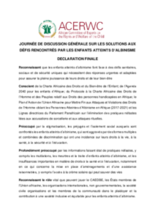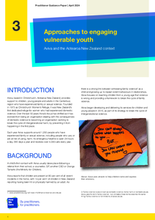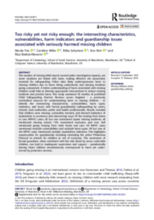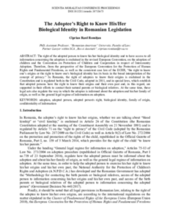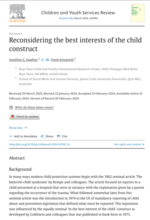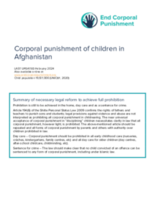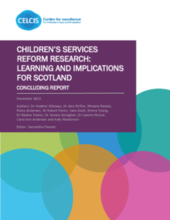Displaying 61 - 70 of 1796
This webinar aimed to create space for reflection on how child rights, parental rights, and family values intersect within faith communities and in public discourse.
This practitioner guide outlines the Aviva program in Christchurch, Aotearoa New Zealand that provides support to children, young people and adults who have experienced family or sexual violenc
This study examined 18 months of published Child Safeguarding Practice Reviews across England to identify the intersecting characteristics, vulnerabilities, harm types, indicators and issues with formal guardianship (safeguarding by carers, schools, local authorities, police and health professionals). Results revealed that children were missing, vulnerable, harmed and showed indicators of exploitation in numerous and intersecting ways.
In this article, the authors present considerations related to the global mandate for child protection and the challenges that persist amongst marginalized communities. Subsequently, they focus on Canada and, in particular, the Ontario example: the trends from the Ontario Incidence Study of Reported Child Abuse and Neglect (OIS). This child welfare epidemiological project has highlighted the need for greater intersectional adjustments to best protect children, where the iterative research-policy cycle has most effectively been seen with a formal system for the inclusion of lived experience, as in the case of Indigenous peoples.
In Romania, the right of adoptees to know their origins is enshrined in the Constitution and is regulated both in the Civil Code, adopted in 2011, and in special laws, which establish that adopted persons have the right to know their origins and their own past and, in this regard, are supported in their efforts to contact their natural parents or biological relatives.
This essential Research Handbook provides a multifaceted exploration of surrogacy and the law, examining a variety of critical yet under-researched perspectives including globalisation, power, gender, sexual orientation, genetics, human rights and family relations.
This article provides an overview of criticisms of the best interests construct and suggestions that the construct is a dated view about what is in a child’s best interests. There is a need for a new balance between explanations about child abuse and neglect (CAN) that takes account of poverty, social disadvantage, and the interests of children and their families.
This is a corporal punishment country report for Afghanistan. In Afghanistan, the Law on Protection of Child Rights 2019 prohibits corporal punishment in alternative care settings and in penal institutions.
The goal of this study was to improve the understanding of current children’s services structures and delivery models in Scotland and how services can best support the needs of children, young people and their families. The research looked at how services are provided and configured in Scotland and drew on a range of international evidence too.

